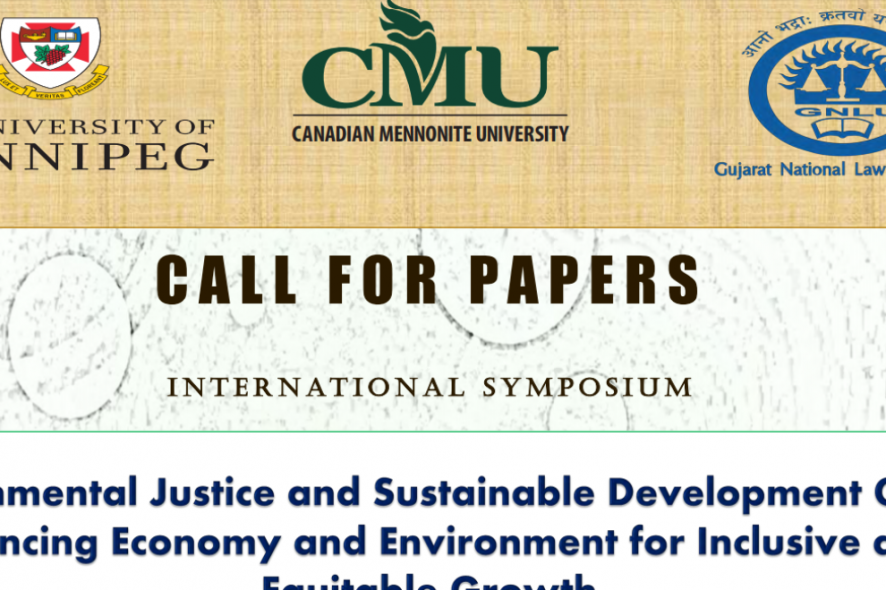The Sustainable Development Goals (SDGs) are imbued with concern for environmental justice. Almost every goal – from ending poverty to combating climate change to revitalizing global partnerships – is dependent on enhancing environmental justice. Goal 16, in particular, with its emphasis on access to justice and effective, accountable and inclusive institutions, highlights the strong connections between sustainable development and environmental justice.
We invite papers on one or more of the SDGs and various aspects of environmental justice, such as:
- Procedural justice: Opportunities for participation in the political and legal processes that create and manage environmental policy, e.g., public interest litigation (PIL), community involvement in environmental impact assessment;
- Distributive justice: Equity in the distribution of risks, benefits and costs of environmental decision making;
- Recognitional justice: Recognition of the diversity of participants and experiences in affected communities, including non-human species and abiotic parts of the ecosphere; and
- Restorative justice: Attempts made to mitigate or re-mediate adverse impacts on people and the environment, e.g., enforcement of licensing conditions, rehabilitation and resettlement policies.
The sub-themes for the symposium are as follows:
- Use and abuse of the public interest litigation (PIL);
- Innovative policies and programs of the government or state for enhancing distributive justice;
- Legislative or policy analysis, including formulation, implementation or enforcement;
- Executive challenges for implementing court judgements;
- Progress and challenges for achieving sustainable development goals (SDG 16) related to environmental justice;
- Assessing international capacity building programmes;
- Empirical field-based case studies;
- Gender analysis of processes, institutions, and outcomes;
- Historical reviews of legislation, policy, institutions or jurisprudence;
- Institutional analysis of specialized green courts and environmental tribunals;
- Indigenous institutions and governance for environmental justice;
- Alternative dispute resolution systems for environmental conflicts;
- Monitoring SDG indicators for environmental justice; and
- Theoretical, conceptual and methodological aspects
We encourage abstract submissions that are relevant to the above themes and sub-themes i.e., those that focus on the interactions between Environmental Justice and the United Nations Sustainable Development Goals.
All abstracts must be submitted by no later than February 8th 2019, at midnight (Indian Standard Time).
We do not anticipate an extension beyond that date and strongly encourage you to submit your abstracts well before the deadline!
Abstracts will be reviewed by a committee of interdisciplinary scholars in the order they are received. Based on the academic rigor, relevance to conference theme, and innovativeness of the content, abstracts will be selected for the limited spots available for the presentation in the conference.
To facilitate early registration and travel planning, the decision notifications regarding acceptance of abstracts to authors will be sent by February 15th, 2019.
Abstracts must be submitted electronically by email to environmentaljustice@gnlu.ac.in
Authors of accepted abstracts are invited to submit, by March 8th 2019, a full paper (maximum 5,000 words) that will be included in the conference materials. A selection of these papers will be considered for inclusion in a peer-reviewed edited volume and a special issue of the GNLU Journal of Law Development and Politics.
Guidelines for Abstracts
Abstracts should be in paragraph form, without bullet points, and should be no more than 300 words. Additionally, the abstract body should include details regarding the background, purpose, methods, results, and conclusions. Please also indicate the theory/analytical framework for the work and provide a description of the research methods used. Contributors are expected to explore the philosophical significance of the questions emerging within the scope of each theme.
Registration Fees
| Indian | Foreign
(US $) |
||
| Registration (covers conference material and food) | Professionals and academicians | Rs. 5000 | $70 |
| Local NGOs and community workers | Rs. 3000 | $70 | |
| Graduate students | Rs. 1500 | $70 | |
| On-campus accommodation | VIP Guesthouse (AC): Single room | Rs. 1700 | $25 |
| VIP Guesthouse (AC): Double (shared) room | Rs. 2300 | $35 |
Participants should send their registration fees, after acceptance of their abstracts, by Crossed Demand Draft in favour of the Registrar, Gujarat National Law University, Gandhinagar. Please write your name and the title of the symposium on the reverse side of the draft or online payment link.
Click HERE for online Payment of Registration Fee
Click HERE for online Registration Form:
Important Dates
- Last date for submitting abstract: 8th February 2019.
- Notification of acceptance of abstract: 15th February 2019.
- Last date for registration: 8th March 2019.
PLEASE NOTE: Individuals are limited to serving as a presenter on only one paper but this does not preclude being a co-author on other papers.
Contact
Please email environmentaljustice@gnlu.ac.in if you have any questions.
For more details, refer symposium






